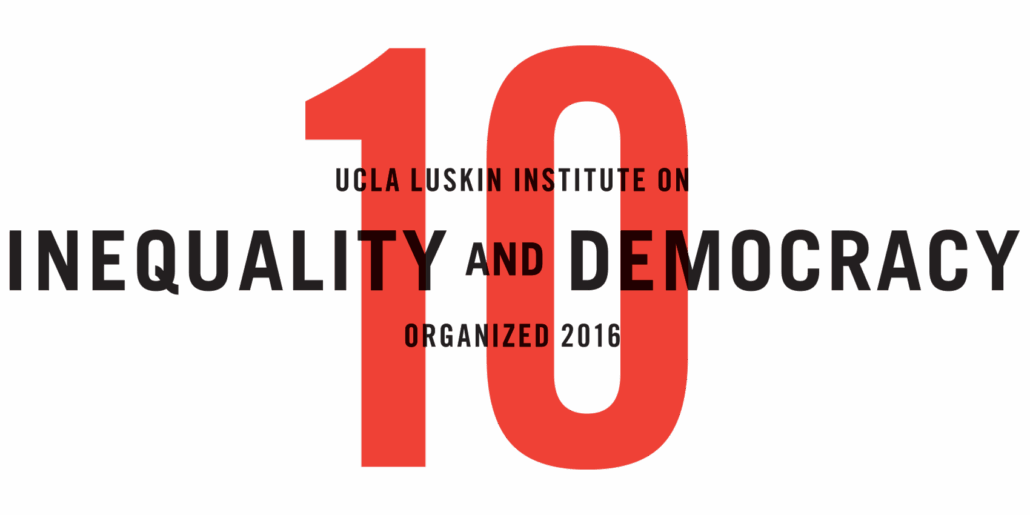Black, Brown, and Powerful: Freedom Dreams in Unequal Cities
Part of the Meyer and Renee Luskin Lecture Series
Thursday, April 26–Friday, April 27, 2018
Los Angeles Trade-Technical College, South Tent
No Longer Trapped Inside by Eden Rain McNutt
Part of the Meyer and Renee Luskin Lecture Series
Thursday, April 26–Friday, April 27, 2018
Los Angeles Trade-Technical College, South Tent
No Longer Trapped Inside by Eden Rain McNutt
In Los Angeles and elsewhere, black and brown communities face multiple forms of banishment and exploitation. At this event, convened by the UCLA Luskin Institute on Inequality and Democracy, we share and discuss research and activism to analyze structures of urban displacement, racialized policing, criminal justice debt, forced labor, and the mass supervision and control of youth. But unequal cities are also where freedom dreams are created and enacted. Located in, and thinking from South Los Angeles, we shine a light on organizing frameworks and resistance strategies that challenge exclusion and refuse subordination.
Thursday, April 26–Friday, April 27, 2018
Los Angeles Trade-Technical College (LATTC), South Tent
| Thursday, 4/26 | 5:00 p.m. – 6:00 p.m. LATTC, South Tent | Welcome Reception and Opening Remarks Gary M. Segura, Dean, UCLA Luskin School of Public Affairs Laurence B. Frank, President, LA Trade-Tech College |
| Thursday, 4/26 | 6:00 p.m. – 8:00 p.m. LATTC, South Tent | From Banishment to Freedom Ananya Roy, UCLA South LA 50 Years after the Kerner Commission Black Workers Rising, Los Angeles Rising Tenant Power: Victories for Housing Justice Resisting Police in Schools & Organizing for Educational Reparations Now Building Power in Watts: Community Leaders & Systems Change Special Performance: Lockdown Unplugged |
| Friday, 4/27 | 8:30 a.m. – 9:30 a.m. LATTC, South Tent | Workshop Registration and Breakfast Friday attendees are requested to participate for the entire day in one of the three workshops. |
| Friday, 4/27 | 9:30 a.m. – 12:30 p.m. Workshop A. LATTC, Apen Hall, Room 101 Workshop B. LATTC, Apen Hall, Room 107 Workshop C. LATTC, Apen Hall, Room 120 | Workshop A. Freedom is a Place: Land, Rent, and Housing Moderators: Terra Graziani, Hilary Malson, and Ananya Roy, UCLA In Los Angeles and elsewhere, working class communities of color are being pushed out of their homes and neighborhoods and face re-segregation at the margins of cities. In this workshop, we examine the housing crisis in Los Angeles County, from the criminalization of the houseless to widespread evictions. We also link this crisis to other sites of struggle, from Santa Ana to the Antelope Valley, and to other urban regions such as the Bay Area. In doing so, we discuss key efforts to address the housing crisis, including community land trusts, rent control, and the campaigns for just cause evictions. Our goal is to share organizing frameworks and strategies and to consider regional alliances for housing justice. Lead participants include: Josefina Aguilar, T.R.U.S.T. South LA; Elizabeth Blaney, Union de Vecinos; Kim Carter, Time for Change; Terra Graziani, Anti-Eviction Mapping Project; Noah Grynberg, Los Angeles Center for Community Law and Action; Gilda Haas, L.A. Coop Lab; Rahim Kurwa, UCLA; Jorge Rivera, Long Beach Residents Empowered; Michael Lens, UCLA; Luis Sarmiento, THRIVE Santa Ana; Tony Roshan Samara, Urban Habitat & Right to the City Alliance; Benny Torres, CD Tech; Pete White, LA Community Action Network. All organizations and movements involved in housing justice are welcome to attend and participate. Workshop B. Moderators: Susan Burton, A New Way of Life Re-Entry Project, and Noah Zatz, UCLA Bail, court fines and fees, driver’s license suspensions, racially profiled traffic stops, court-ordered community service. As millions are spent on policing, arresting, and incarcerating people in working class communities of color, these same systems are also extracting resources from the same communities, in the form of both cash and labor. And the failure to pay these debts often means further criminalization. Mass incarceration is thus also mass economic extraction, draining families of the resources needed to live and thrive, substituting policing for investment and forced labor for good jobs. This workshop examines these links among racialized policing, debt, and labor as forms of institutionalized theft. Our goal is to share research, organizing frameworks and resistance strategies, and to lift up the work of organizations working hard to break the cycle of mass joblessness, mass incarceration, and mass extraction. All organizations and movements connecting work against mass incarceration and for economic justice are welcome to attend and participate. Lead participants include: CT Turney-Lewis, A New Way of Life Reentry Project; Theresa Zhen, Back on the Road Coalition, East Bay Community Law Center; Laura Hanna, Debt Collective, Alvin Teng, Million Dollar Hoods; Tia Koonse, UCLA Labor Center; Jeylee Quiroz, UCLA Labor Center. Workshop C. Moderators: Laura Abrams, UCLA, Manuel Criollo, Activist-in-Residence, UCLA, and Matthew Mizel, UCLA & InsideOut Writers Youth of color in the United States are disproportionately supervised and incarcerated in the justice system. A number of structures feed and maintain this process, including the education, social welfare, policing, and probation systems. In this workshop, we will explore the way these social structures function and produce the mass supervision and control of youth. The narratives of those with lived experiences as both youth and adult advocates will center our discussion. We will collaboratively seek strategies to move the treatment and care of our youth to be more life sustaining. Towards that end, we invite all whose work touches and is touched by juvenile justice and the systems that entangle with it. Lead participants include: Jesse Aguiar, Journey House; Carlos Arceo, Public Allies, CDTech; Yahniie Bridges, Social Justice Advocate; Kesi Bem Foster, Urban Youth Collaborative; Michael Mendoza, #cut50; Javier Rodriguez, Underground Scholars Initiative, UCLA; Jasmine Williams, Black Organizing Project; Jimmy Wu, InsideOut Writers. |
| Friday, 4/27 | 12:30 p.m. – 1:00 p.m. LATTC, South Tent | Lunch |
| Friday, 4/27 | 1:00 p.m. – 1:30 p.m. LATTC, South Tent | Special Performance: Woke Black Folk Funmilola Fagbamila, Black Lives Matter LA |
| Friday, 4/27 | 1:30 p.m. – 3:00 p.m. LATTC, South Tent | Freedom Dreams in Unequal Cities Moderators: Ananya Roy, UCLA, and Pete White, LA Community Action Network A joint convening of the three workshops to share research and analysis, frameworks and strategies for organizing, and possibilities for shared visions and proposals. |
Address
Los Angeles Trade-Tech College
400 West Washington Blvd.
Los Angeles, CA 90015-4108
Our venue for Thursday’s, 4/26 evening event will be held at the LATTC South Tent (across from Aspen Hall) and the venue for Friday’s, 4/27 workshops will be held at LATTC Aspen Hall in rooms 101, 107 and 120 (rooms depending on your chosen workshop). Here is a campus map.
Driving to LATTC
Public Transportation
Parking
The nearest parking is “24th Street Parking Structure” and it is between 24th St. and Grand Ave. Parking is free. (Please plan for extra time to find parking)
(for external speakers)
Overnight accommodations will be near the Los Angeles Trade-Technical College.
Hors d’oeuvres will be available during the welcome reception on Thursday, 4/26.
Light breakfast will be available on Friday, 4/27.
Refreshments and snacks will be made available throughout the workshops on Friday, 4/27.
Lunch will be from 12:30 –1 p.m. on Friday, 4/27.
Alvin Teng
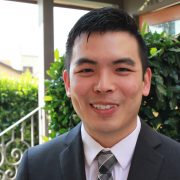 Alvin Teng is a second year Master of Public Policy candidate at UCLA Luskin School of Public Affairs and will be graduating in June of 2018. He is passionate about data-driven policy solutions at the intersection of racial and socio-economic inequality, particularly in the areas of police accountability, reentry policy, criminal justice reform, community development, and equitable housing policy. He is currently a researcher with the Million Dollar Hoods Project at UCLA, and has worked with Public Policy Institute of California, Drug Policy Alliance, and International Justice Mission.
Alvin Teng is a second year Master of Public Policy candidate at UCLA Luskin School of Public Affairs and will be graduating in June of 2018. He is passionate about data-driven policy solutions at the intersection of racial and socio-economic inequality, particularly in the areas of police accountability, reentry policy, criminal justice reform, community development, and equitable housing policy. He is currently a researcher with the Million Dollar Hoods Project at UCLA, and has worked with Public Policy Institute of California, Drug Policy Alliance, and International Justice Mission.
Ananya Roy
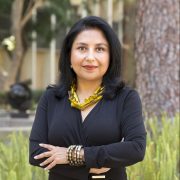 Ananya Roy is Professor of Urban Planning, Social Welfare and Geography and inaugural Director of the Institute on Inequality and Democracy at UCLA Luskin. She holds The Meyer and Renee Luskin Chair in Inequality and Democracy. Previously she was on the faculty at the University of California, Berkeley, where she founded and played a leadership role in several academic programs including those concerned with poverty research and poverty action.
Ananya Roy is Professor of Urban Planning, Social Welfare and Geography and inaugural Director of the Institute on Inequality and Democracy at UCLA Luskin. She holds The Meyer and Renee Luskin Chair in Inequality and Democracy. Previously she was on the faculty at the University of California, Berkeley, where she founded and played a leadership role in several academic programs including those concerned with poverty research and poverty action.
Ananya’s research and scholarship has a determined focus on poverty and inequality and lies in four domains: how the urban poor in cities from Kolkata to Chicago face and fight eviction, foreclosure, and displacement; how global financialization, working in varied realms from microfinance to real-estate speculation, creates new markets in debt and risk; how the efforts to manage and govern the problem of poverty reveal the contradictions and limits of liberal democracy; how economic prosperity and aspiration in the global South is creating new potentialities for programs of human development and social welfare.
Ananya is the recipient of several awards including the Paul Davidoff book award, which recognizes scholarship that advances social justice, for Poverty Capital: Microfinance and the Making of Development (Routledge, 2010); the Distinguished Teaching Award, the highest teaching recognition that the University of California, Berkeley bestows on its faculty; and the Excellence in Achievement award of the Cal Alumni Association, a lifetime achievement award which celebrates her contributions to the University of California and public sphere.
Benny Torres
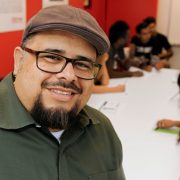 Benjamin Torres is the President and Chief Executive Officer of the Community Development Technologies Center (CDTech), a 501 (C)(3) nonprofit focused on addressing issues of community and economic development in low-income areas of Los Angeles through a social justice lens that empowers residents and communities to rebuild them. Benjamin’s entire career has been focused on placing the tools of democracy directly in the hands of society’s most marginalized residents through education, training, engagement and multi-cultural, multi-ethnic, multi-linguistic community building. For the last 19 years his voice and leadership have supported the South LA region’s Black/Brown neighborhoods to increase their social capital and economic opportunity through inclusive democratic action and the strategic utilization of highly effective public, private, nonprofit and resident partnerships. Benjamin has been with CDTech since 2002. Prior to his appointment by the board in 2010 as CDTech’s President and CEO, Benjamin served as the Vice President of the Working Democracy Division and Director of CDTech’s Community Planning program at Los Angeles Trade-Technical College (LATTC); the MultiCultural Collaborative’s Community School Initiative in Watts; and, the Multi-Cultural Education Consortium in Santa Barbara.
Benjamin Torres is the President and Chief Executive Officer of the Community Development Technologies Center (CDTech), a 501 (C)(3) nonprofit focused on addressing issues of community and economic development in low-income areas of Los Angeles through a social justice lens that empowers residents and communities to rebuild them. Benjamin’s entire career has been focused on placing the tools of democracy directly in the hands of society’s most marginalized residents through education, training, engagement and multi-cultural, multi-ethnic, multi-linguistic community building. For the last 19 years his voice and leadership have supported the South LA region’s Black/Brown neighborhoods to increase their social capital and economic opportunity through inclusive democratic action and the strategic utilization of highly effective public, private, nonprofit and resident partnerships. Benjamin has been with CDTech since 2002. Prior to his appointment by the board in 2010 as CDTech’s President and CEO, Benjamin served as the Vice President of the Working Democracy Division and Director of CDTech’s Community Planning program at Los Angeles Trade-Technical College (LATTC); the MultiCultural Collaborative’s Community School Initiative in Watts; and, the Multi-Cultural Education Consortium in Santa Barbara.
He is committed to building leadership capacity in South Central Los Angeles and serves on the Board of Directors of key organizations; Strategic Concepts in Organizing and Policy Education (SCOPE), T.R.U.S.T. SLA and the For Chicana/o Studies Foundation. He serves as a City of LA Commissioner on the Community and Family Services Commission. Benjamin lives in Echo Park, where he proudly grew up and lives with his long-time partner Juana Mora and his daughters Aurelia and Camila Valentina.
Bryonn Bain
 Described by Cornel West as an artist who “…speaks his truth with a power we desperately need to hear,” Bryonn Bain is a hip hop theater innovator, spoken word poetry champion, prison activist, actor and educator. Wrongfully imprisoned while studying at Harvard Law, Bryonn sued the NYPD, interviewed with Mike Wallace on “60 Minutes,” and wrote The Village Voice cover story – “Walking While Black” which received over 100,000 replies — the largest response in the history of the nation’s most widely-read progressive newspaper. Bain organized prison workshops in 25 states on his annual tour to correctional facilities nationwide. His critically acclaimed one-man multimedia production, Lyrics From Lockdown – executive produced by Harry Belafonte – tells the story of his wrongful imprisonment through hip hop theater, spoken word poetry, calypso, classical music, and letters exchanged with fellow poet, Nanon Williams, who was sentenced to Death Row at 17 for a crime he did not commit. Developed in prisons across the country, the production has sold out on three continents with standing ovations in Europe, Asia and Africa. Bain’s latest film — “BaaaddD Sonia” — tracing the life and work of Black Studies pioneer and poet Sonia Sanchez, was nominated for a 2017 Emmy. Bryonn’s discussions on BET’s award-winning show My Two Cents aired weekly in over 20 million homes, and his interviews have included Dolores Huerta, Tavis Smiley, LL Cool J, Tricia Rose, Tim Robbins and Snoop Dogg.
Described by Cornel West as an artist who “…speaks his truth with a power we desperately need to hear,” Bryonn Bain is a hip hop theater innovator, spoken word poetry champion, prison activist, actor and educator. Wrongfully imprisoned while studying at Harvard Law, Bryonn sued the NYPD, interviewed with Mike Wallace on “60 Minutes,” and wrote The Village Voice cover story – “Walking While Black” which received over 100,000 replies — the largest response in the history of the nation’s most widely-read progressive newspaper. Bain organized prison workshops in 25 states on his annual tour to correctional facilities nationwide. His critically acclaimed one-man multimedia production, Lyrics From Lockdown – executive produced by Harry Belafonte – tells the story of his wrongful imprisonment through hip hop theater, spoken word poetry, calypso, classical music, and letters exchanged with fellow poet, Nanon Williams, who was sentenced to Death Row at 17 for a crime he did not commit. Developed in prisons across the country, the production has sold out on three continents with standing ovations in Europe, Asia and Africa. Bain’s latest film — “BaaaddD Sonia” — tracing the life and work of Black Studies pioneer and poet Sonia Sanchez, was nominated for a 2017 Emmy. Bryonn’s discussions on BET’s award-winning show My Two Cents aired weekly in over 20 million homes, and his interviews have included Dolores Huerta, Tavis Smiley, LL Cool J, Tricia Rose, Tim Robbins and Snoop Dogg.
Carlos Arceo
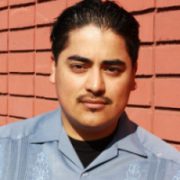 A son of immigrants from Mexico, father of two, and a native of Southeast Los Angeles (Huntington Park and South Gate), Carlos M. Arceo got his first opportunity to work as a trainer/educator/faciliator as undergrad English major at UC Berkeley. Carlos worked in several East Oakland schools, in various capacities, always with the larger goal in mind to empower both youth of color and their families inside and outside the educational system. Upon returning to Los Angeles in 2005, Carlos began work running an arts-based, social justice, youth development program. Facilitating classroom lessons as well as running a youth leadership development program allowed Carlos the opportunity to hold and foster spaces designed for youth to recognize not only social justice issues, but their role in affecting change, and building both their individual and collective power.
A son of immigrants from Mexico, father of two, and a native of Southeast Los Angeles (Huntington Park and South Gate), Carlos M. Arceo got his first opportunity to work as a trainer/educator/faciliator as undergrad English major at UC Berkeley. Carlos worked in several East Oakland schools, in various capacities, always with the larger goal in mind to empower both youth of color and their families inside and outside the educational system. Upon returning to Los Angeles in 2005, Carlos began work running an arts-based, social justice, youth development program. Facilitating classroom lessons as well as running a youth leadership development program allowed Carlos the opportunity to hold and foster spaces designed for youth to recognize not only social justice issues, but their role in affecting change, and building both their individual and collective power.
For the past 11 years, Carlos has worked for CDTech, an organization dedicated to Social Justice and Racial Equity for the people of South Central Los Angeles, working to ensure the empowered participation of residents in community self-determination. Through his role as Public Allies Los Angeles Program Manager, Training and Learning Manager, and now Director, Carlos leads a talented team responsible for running an elite, nationally recognized leadership development program that not only builds the capacity of local South L.A. leaders through rigorous professional development and consciousness-raising trainings, but diversifies the non-profit sector by partnering participants to work in local non-profits, and enrolls them in Community Planning courses at LATTC, thereby putting participants on pathways to Higher Education, Employment, and National Service.
CT Turney-Lewis
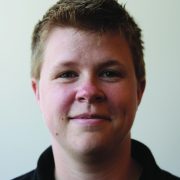 CT Turney-Lewis is the senior staff attorney at A New Way of Life Reentry Project, focusing on adult clean slate remedies, occupational licensing, and other means of reducing and overcoming barriers to employment for people with conviction histories. From 2011 to 2015, CT headed the Reentry Legal Clinic at ANWOL, the largest clean slate clinic in Southern California, representing clients in nearly 1,000 clean slate petitions each year, and resulting in a published decision to clarify eligibility requirements for dismissal under P.C. 1203.4 (People v. Parker, 217 Cal.App.4th 498 (2013)). CT’s work at ANWOL has also included litigation to enforce access to courts for people pursuing clean slate remedies, and assisting efforts to develop local Ban the Box policies in Los Angeles County.
CT Turney-Lewis is the senior staff attorney at A New Way of Life Reentry Project, focusing on adult clean slate remedies, occupational licensing, and other means of reducing and overcoming barriers to employment for people with conviction histories. From 2011 to 2015, CT headed the Reentry Legal Clinic at ANWOL, the largest clean slate clinic in Southern California, representing clients in nearly 1,000 clean slate petitions each year, and resulting in a published decision to clarify eligibility requirements for dismissal under P.C. 1203.4 (People v. Parker, 217 Cal.App.4th 498 (2013)). CT’s work at ANWOL has also included litigation to enforce access to courts for people pursuing clean slate remedies, and assisting efforts to develop local Ban the Box policies in Los Angeles County.
CT earned their J.D. from UCLA School of Law, with specializations in Public Interest Law and Policy, and Critical Race Studies. Prior to coming to Los Angeles, CT earned a B.A. in Communication from Rutgers University, and worked for eight years as a software technical writer in Pittsburgh, Pennsylvania. They still bleed black and gold.
Funmilola Fagbamila
 Funmilola Fagbamila is a Nigerian American scholar, activist, playwright and artist. She currently serves as a professor of Pan African Studies at California State University, Los Angeles. As an original member of the Black Lives Matter Movement, Funmilola has been organizing with BLM since its inception in 2013. She is the current Arts and Culture director for the BLM Los Angeles chapter.
Funmilola Fagbamila is a Nigerian American scholar, activist, playwright and artist. She currently serves as a professor of Pan African Studies at California State University, Los Angeles. As an original member of the Black Lives Matter Movement, Funmilola has been organizing with BLM since its inception in 2013. She is the current Arts and Culture director for the BLM Los Angeles chapter.
While her artistry is multifaceted, including spoken word and hip hop, Funmilola’s current project, entitled “The Intersection: Woke Black Folk”, is a stage play on the complexities of black political identity. This project has been met with critical acclaim by thinkers and artists such as Angela Davis and Erykah Badu. It premiered in March of this year as the featured theatrical production for Pan African Film Festival in Los Angeles.
In 2015, Funmilola was honored by the United States Congress and the Black Community, Clergy and Labor Alliance for her “commendable activist scholarship, service and struggle”. In 2017, Funmilola was awarded the Inaugural Activist-in-Residence position at the Institute on Inequality and Democracy at UCLA Luskin. Her writing, political analyses and social commentary have been featured in publications such as the Guardian, NPR and NowThis News.
She frequently sits on community panels and presents keynotes on the topics of critical race theory, criminal justice, intersectional politics, black arts and contemporary pan-africanism – having presented in spaces such as the Congressional Black Caucus Foundation’s Annual Legislative Conference to the UCLA School of Law.
Gary M. Segura
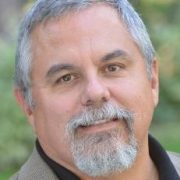 Gary M. Segura is the Dean of the Luskin School of Public Affairs at UCLA.
Gary M. Segura is the Dean of the Luskin School of Public Affairs at UCLA.
His work focuses on issues of political representation and social cleavages, the domestic politics of wartime public opinion, and the politics of America’s growing Latino minority. Among his most recent publications are “Latino America: How America’s Most Dynamic Population is Poised to Transform the Politics of the Nation” with Matt Barreto (Public Affairs Press, 2014); “The Future is Ours: Minority Politics, Political Behavior, and the Multiracial Era of American Politics” with Shaun Bowler (2011, Congressional Quarterly Press), and two books with the Latino National Survey team: “Latinos in the New Millennium: An Almanac of Opinion, Behavior, and Policy Preferences” (2012, Cambridge University Press), and “Latino Lives in America: Making It Home” (2010, Temple University Press). He has another book in press, “Calculated War: The Public and a Theory of Conflict,” with Scott S. Gartner, under contract to Cambridge University Press.
Earlier work has been published in the American Political Science Review, American Journal of Political Science, Journal of Politics, Political Research Quarterly, and the Annual Review of Political Science, among many others.
Over the last 18 years, he has directed polling research that has completed over 100,000 interviews of Americans of all backgrounds on matters of political importance. He has briefed members of both the House and Senate as well as senior administration officials and appeared on National Public Radio, the “News Hour,” “Frontline,” “the CBS Evening News,” MSNBC, and numerous other outlets.
Gilda Haas
 Gilda Haas is an organizer, popular educator, and urban planner who has been helping grassroots organizations build economic projects and institutions from the ground up for the past thirty-five years. Gilda taught community economic development at UCLA’s Department of Urban Planning for about 30 years, where she also co-founded the Community Scholars Program, and was on the faculty of Antioch University’s Urban Sustainability program for five years where she co-founded the Big Question Lab. Gilda was the founding Executive Director of Strategic Actions for a Just Economy, a co-founder of the national Right to the City Alliance, and has developed business strategies for democratic enterprises such as a credit union and land trust. Gilda presently works as a member of the L.A. Coop Lab collective; as her alter-ego, Dr. Pop; as a consultant to The California Endowment on matters related to gentrification and displacement; and as a local loan officer with The Working World.
Gilda Haas is an organizer, popular educator, and urban planner who has been helping grassroots organizations build economic projects and institutions from the ground up for the past thirty-five years. Gilda taught community economic development at UCLA’s Department of Urban Planning for about 30 years, where she also co-founded the Community Scholars Program, and was on the faculty of Antioch University’s Urban Sustainability program for five years where she co-founded the Big Question Lab. Gilda was the founding Executive Director of Strategic Actions for a Just Economy, a co-founder of the national Right to the City Alliance, and has developed business strategies for democratic enterprises such as a credit union and land trust. Gilda presently works as a member of the L.A. Coop Lab collective; as her alter-ego, Dr. Pop; as a consultant to The California Endowment on matters related to gentrification and displacement; and as a local loan officer with The Working World.
Hilary Malson
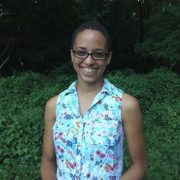 Hilary Malson is a PhD student in Urban Planning at UCLA, where she studies suburbs, race, migration, and spatial justice. She has worked at the intersection of community development and public history in Philadelphia and D.C. for the past decade. Prior to joining the UCLA community, she worked at the Smithsonian Institution’s Anacostia Community Museum to conduct research for “A Right to the City,” an exhibit on neighborhood organizing and activism. Outside of the classroom, she is partnering with LACCLA, the Anti-Eviction Mapping Project, and the Institute on Inequality and Democracy to record oral histories with Angelenos fighting displacement in unincorporated East L.A. Hilary proudly hails from D.C. and enjoys photographing city life in her spare time.
Hilary Malson is a PhD student in Urban Planning at UCLA, where she studies suburbs, race, migration, and spatial justice. She has worked at the intersection of community development and public history in Philadelphia and D.C. for the past decade. Prior to joining the UCLA community, she worked at the Smithsonian Institution’s Anacostia Community Museum to conduct research for “A Right to the City,” an exhibit on neighborhood organizing and activism. Outside of the classroom, she is partnering with LACCLA, the Anti-Eviction Mapping Project, and the Institute on Inequality and Democracy to record oral histories with Angelenos fighting displacement in unincorporated East L.A. Hilary proudly hails from D.C. and enjoys photographing city life in her spare time.
Jasmine Williams
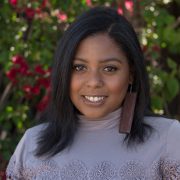 Jasmine is a Sacramento native with a passion for reading and writing. She fell in love with the Bay Area in 2011 when she began her academic journey at San Francisco State University where she was an editor for the school magazine; Xpress Magazine. From SF State she achieved her BA degree in Journalism with a minor in Africana Studies and was determined to pour resources back into her community.
Jasmine is a Sacramento native with a passion for reading and writing. She fell in love with the Bay Area in 2011 when she began her academic journey at San Francisco State University where she was an editor for the school magazine; Xpress Magazine. From SF State she achieved her BA degree in Journalism with a minor in Africana Studies and was determined to pour resources back into her community.
Jasmine has worked for the Black Organizing Project for 2 years as their Development and Communications Coordinator. In her position she feels privileged to use her writing and storytelling to help shift the narrative of her people and ensure that Black people have a platform to uplift their truth and experiences. With BOP, Jasmine is excited about reaffirming and celebrating the beauty of Blackness through storytelling, community building and organizing.
Javier Rodriguez
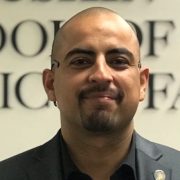 Javier is a 1st year MSW student in the Department of Social Welfare at UCLA. He cofounded Underground Scholars Initiative at UCLA and is the current Co-Chair. Underground Scholars initiative is a student group supports all current and prospective students impacted by mass incarceration, imprisonment and involuntary detainment of any kind. Javier is a passionate student activist and community organizer motivated to dismantle the school to prison pipeline and diminish Mass incarceration.
Javier is a 1st year MSW student in the Department of Social Welfare at UCLA. He cofounded Underground Scholars Initiative at UCLA and is the current Co-Chair. Underground Scholars initiative is a student group supports all current and prospective students impacted by mass incarceration, imprisonment and involuntary detainment of any kind. Javier is a passionate student activist and community organizer motivated to dismantle the school to prison pipeline and diminish Mass incarceration.
Jeylee Quiroz
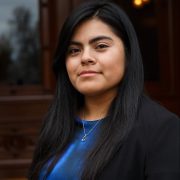 Jeylee Quiroz is a Research Assistant at the UCLA Labor Center and works closely with the legal policy research manager. She graduated from UCLA with a BA in Political Science and a minor in Labor and Workplace Studies. Her interests lie in public policy advocacy for worker, economic, and social justice. Currently, she is an economic justice fellow of the Women’s Policy Institute where she is working on the passage of SB 1233(McGuire), the Community Service Opportunity Act which seeks to expand community service options to include educational and professional development opportunities for qualifying traffic infractions and quality of life citations. In addition, she is one of the lead researchers of the I am a #YOUNGWORKER project, a multimedia research initiative that combines data, stories, and images by and for young people. This project is the culmination of participatory student-led research that analyzed over 550 surveys of young workers across Los Angeles County and gets to the core of what young workers in Los Angeles County are facing today.
Jeylee Quiroz is a Research Assistant at the UCLA Labor Center and works closely with the legal policy research manager. She graduated from UCLA with a BA in Political Science and a minor in Labor and Workplace Studies. Her interests lie in public policy advocacy for worker, economic, and social justice. Currently, she is an economic justice fellow of the Women’s Policy Institute where she is working on the passage of SB 1233(McGuire), the Community Service Opportunity Act which seeks to expand community service options to include educational and professional development opportunities for qualifying traffic infractions and quality of life citations. In addition, she is one of the lead researchers of the I am a #YOUNGWORKER project, a multimedia research initiative that combines data, stories, and images by and for young people. This project is the culmination of participatory student-led research that analyzed over 550 surveys of young workers across Los Angeles County and gets to the core of what young workers in Los Angeles County are facing today.
Jimmy Wu
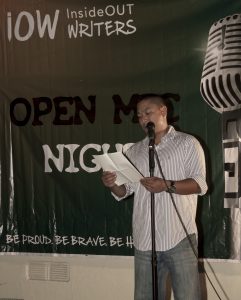 Jimmy Wu is the Executive Director at InsideOUT Writers (IOW), a nonprofit organization that teaches nearly 40 weekly creative writing classes inside the Los Angeles County juvenile halls and 5 adult state prisons. Over twenty years ago, when he was just 16 years old, Jimmy made a horrible decision to commit a crime which resulted in 13 ½ years of incarceration. It was during his time in a juvenile detention facility in Los Angeles that he was introduced to IOW and became one of the organization’s first creative writing students. His firsthand experiences of growing up in our California detention facilities has resulted in him being an advocate for juvenile justice reform and his work at IOW allows him to assist with providing direct reentry services and support to young men and women returning to society while also overseeing all administrative responsibilities and actively fundraising on behalf of IOW. It is his hope that the young people he works with will learn from his mistakes and not walk down the wrong path as he once did. In the past 5 ½ years of being on staff at IOW, Jimmy has embraced his previous roles as IOW’s Case Manager and Alumni Advocacy Director, followed by Interim Executive Director and now Executive Director.
Jimmy Wu is the Executive Director at InsideOUT Writers (IOW), a nonprofit organization that teaches nearly 40 weekly creative writing classes inside the Los Angeles County juvenile halls and 5 adult state prisons. Over twenty years ago, when he was just 16 years old, Jimmy made a horrible decision to commit a crime which resulted in 13 ½ years of incarceration. It was during his time in a juvenile detention facility in Los Angeles that he was introduced to IOW and became one of the organization’s first creative writing students. His firsthand experiences of growing up in our California detention facilities has resulted in him being an advocate for juvenile justice reform and his work at IOW allows him to assist with providing direct reentry services and support to young men and women returning to society while also overseeing all administrative responsibilities and actively fundraising on behalf of IOW. It is his hope that the young people he works with will learn from his mistakes and not walk down the wrong path as he once did. In the past 5 ½ years of being on staff at IOW, Jimmy has embraced his previous roles as IOW’s Case Manager and Alumni Advocacy Director, followed by Interim Executive Director and now Executive Director.
Jorja Leap
 Jorja Leap has been a member of the faculty of the Department of Social Welfare in the UCLA Luskin School of Public Affairs since 1992 and serves as the Executive Director of the UCLA Social Justice Research Partnership. As an anthropologist and recognized expert in gangs, violence, and change, she develops, coordinates and directs real-life scholarly efforts that involve research, evaluation and policy recommendations at the local, state and national level. At the international level in partnership with the United Nations World Health Organization (WHO), St. Andrews University, Scotland and the University of Cape Town, South Africa, Dr. Leap works on similar issues and their relationship to systems change. She also serves as the Qualitative Research Director for the City of Los Angeles Mayor’s Office Gang Reduction and Youth Development Department and as a Gang Expert for the U.S. Federal Public Defender. Along with her ongoing research on gangs, prison and community reentry, Dr. Leap’s most recent work focuses on organizational evaluation and capacity creation at nonprofit agencies including Homeboy Industries and A New Way of Life. She is the co-founder of the UCLA Watts Leadership Institute, working closely with the community-based leaders of Watts as well as its nonprofit network. Dr. Leap has authored numerous reports, chapters, and books, including Jumped In: What Gangs taught me about Violence, Drugs, Love and Redemption and Project Fatherhood: A Story of Courage and Healing in one of America’s Toughest Communities. She is currently working on a book on Women, Prison and Reentry.
Jorja Leap has been a member of the faculty of the Department of Social Welfare in the UCLA Luskin School of Public Affairs since 1992 and serves as the Executive Director of the UCLA Social Justice Research Partnership. As an anthropologist and recognized expert in gangs, violence, and change, she develops, coordinates and directs real-life scholarly efforts that involve research, evaluation and policy recommendations at the local, state and national level. At the international level in partnership with the United Nations World Health Organization (WHO), St. Andrews University, Scotland and the University of Cape Town, South Africa, Dr. Leap works on similar issues and their relationship to systems change. She also serves as the Qualitative Research Director for the City of Los Angeles Mayor’s Office Gang Reduction and Youth Development Department and as a Gang Expert for the U.S. Federal Public Defender. Along with her ongoing research on gangs, prison and community reentry, Dr. Leap’s most recent work focuses on organizational evaluation and capacity creation at nonprofit agencies including Homeboy Industries and A New Way of Life. She is the co-founder of the UCLA Watts Leadership Institute, working closely with the community-based leaders of Watts as well as its nonprofit network. Dr. Leap has authored numerous reports, chapters, and books, including Jumped In: What Gangs taught me about Violence, Drugs, Love and Redemption and Project Fatherhood: A Story of Courage and Healing in one of America’s Toughest Communities. She is currently working on a book on Women, Prison and Reentry.
Josefina Aguilar
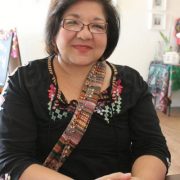 Josefina was born and raised in Los Angeles and has over 25 years of experience in city planning, focusing on community development and affordable housing for families and seniors. She has worked in the cities of Palmdale, San Fernando, Simi Valley, Redlands and Santa Barbara, managing housing development and assistance programs and projects. Ms. Aguilar has also worked in the non-profit sector, developing resident-controlled housing by acquiring and remodeling substandard housing to make them habitable for low income families. She has managed development and rehabilitation programs with budgets of over $4M that improved aging housing stock, assisted seniors with emergency repairs and preserved historic structures in the community. Ms. Aguilar recently retired from public service as a Senior Planner/Housing Program Manager. She is a successful Community Development Block Grant (CDBG) grant writer and has consulted in the areas of strategic planning and organizational development for non-profit boards. Josefina is a graduate of the Chicano/Chicana Studies program at CSU Northridge and of the Urban Planning graduate program at UCLA.
Josefina was born and raised in Los Angeles and has over 25 years of experience in city planning, focusing on community development and affordable housing for families and seniors. She has worked in the cities of Palmdale, San Fernando, Simi Valley, Redlands and Santa Barbara, managing housing development and assistance programs and projects. Ms. Aguilar has also worked in the non-profit sector, developing resident-controlled housing by acquiring and remodeling substandard housing to make them habitable for low income families. She has managed development and rehabilitation programs with budgets of over $4M that improved aging housing stock, assisted seniors with emergency repairs and preserved historic structures in the community. Ms. Aguilar recently retired from public service as a Senior Planner/Housing Program Manager. She is a successful Community Development Block Grant (CDBG) grant writer and has consulted in the areas of strategic planning and organizational development for non-profit boards. Josefina is a graduate of the Chicano/Chicana Studies program at CSU Northridge and of the Urban Planning graduate program at UCLA.
Kesi Bem Foster
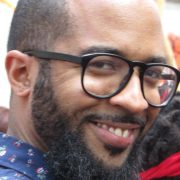 Kesi Foster is a Lead Organizer at Make The Road New York. Prior to organizing with Make The Road, Kesi was the Coordinator for the Urban Youth Collaborative, the largest youth-led coalition in New York City. The Urban Youth Collaborative brings together young people from across New York City to organize for racial justice and equity in the public school system. Previously, he worked at the Annenberg Institute for School Reform supporting grassroots community organizations building campaigns for educational justice, advocating for community-led solutions, including community schools and ending the school-to-prison pipeline. Before joining movements for educational justice, he held positions as the Project Coordinator for the Right to Vote Campaign, and worked with formerly incarcerated individuals and public housing residents in New York City, facilitating back to work skill building workshops.
Kesi Foster is a Lead Organizer at Make The Road New York. Prior to organizing with Make The Road, Kesi was the Coordinator for the Urban Youth Collaborative, the largest youth-led coalition in New York City. The Urban Youth Collaborative brings together young people from across New York City to organize for racial justice and equity in the public school system. Previously, he worked at the Annenberg Institute for School Reform supporting grassroots community organizations building campaigns for educational justice, advocating for community-led solutions, including community schools and ending the school-to-prison pipeline. Before joining movements for educational justice, he held positions as the Project Coordinator for the Right to Vote Campaign, and worked with formerly incarcerated individuals and public housing residents in New York City, facilitating back to work skill building workshops.
Kim Carter
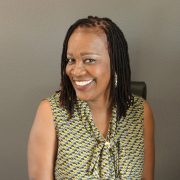 Kim Carter is the Founder and Ambassador of Time for Change Foundation. Today she is a powerful leader for transforming the lives of those impacted by poverty, marginalization and recidivism. In 2002, she started Time for Change Foundation for homeless women and quickly created housing for women and their children. As a thriving entrepreneur for the past 16 years she created a plethora of evidence-based programs and services in addition to adding 1 more shelter, 13 permanent supportive housing units and developing her first affordable housing project the Phoenix Square. The agency’s budget has grown 500% since its humble beginnings in 2002 with current annual revenues exceeding 3 million dollars.
Kim Carter is the Founder and Ambassador of Time for Change Foundation. Today she is a powerful leader for transforming the lives of those impacted by poverty, marginalization and recidivism. In 2002, she started Time for Change Foundation for homeless women and quickly created housing for women and their children. As a thriving entrepreneur for the past 16 years she created a plethora of evidence-based programs and services in addition to adding 1 more shelter, 13 permanent supportive housing units and developing her first affordable housing project the Phoenix Square. The agency’s budget has grown 500% since its humble beginnings in 2002 with current annual revenues exceeding 3 million dollars.
In 2017, Kim created the Center for Housing Advancement and Motivational Projects whereby she conducts capacity building trainings for professional organization. Using her passion and drive she created opportunities to assist other nonprofits with scaling and strengthening their agency’s capacity to demonstrate performance, collect evidence and market those results for greater community impact.
Laura Abrams
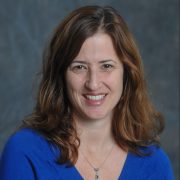 Dr. Laura S. Abrams is a Professor and Chair of the Department of Social Welfare at UCLA Luskin School of Public Affairs. Her ethnographic scholarship has focused on the experiences of youth in the juvenile justice system and in the transition to adulthood. Currently she is pursuing policy research in the area of juvenile justice reform, which incorporates cross-national comparative studies. Dr. Abrams has served as an expert witness for capital cases and has provided expert testimony regarding solitary confinement, standards of care in correctional facilities, and community reintegration. She is the author of Compassionate Confinement: A Year in the Life of Unit C (2013; Rutgers University Press) and Everyday Desistance: The Transition to Adulthood Among Formerly Incarcerated Youth (2017, Rutgers University Press) and is the lead editor of the volume: The Voluntary Sector in Prisons: Encouraging Personal and Institutional Change (2016, Palgrave).
Dr. Laura S. Abrams is a Professor and Chair of the Department of Social Welfare at UCLA Luskin School of Public Affairs. Her ethnographic scholarship has focused on the experiences of youth in the juvenile justice system and in the transition to adulthood. Currently she is pursuing policy research in the area of juvenile justice reform, which incorporates cross-national comparative studies. Dr. Abrams has served as an expert witness for capital cases and has provided expert testimony regarding solitary confinement, standards of care in correctional facilities, and community reintegration. She is the author of Compassionate Confinement: A Year in the Life of Unit C (2013; Rutgers University Press) and Everyday Desistance: The Transition to Adulthood Among Formerly Incarcerated Youth (2017, Rutgers University Press) and is the lead editor of the volume: The Voluntary Sector in Prisons: Encouraging Personal and Institutional Change (2016, Palgrave).
Laurence B. Frank
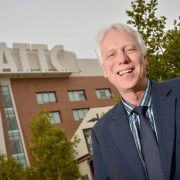
7/1/14 – Laurence Frank, president of Los Angeles Trade-Technical College.
Photo by Steven Georges
Larry Frank was born in Portland, Maine and spent time in New York and Colorado before moving to Los Angeles at age 23, where he has remained ever since. He majored in Religious Studies at what is now St. Lawrence University. The move to LA was prompted by work for the United Farm Workers Union, followed by work with the Amalgamated Clothing and Textile Workers Union and the Communication Workers of America. Then, in the 1980s he led the Jobs with Peace Initiatives, which were voter-sponsored signature gathering efforts that place two initiatives on the 1984 and 1986 LA city ballots. He attended UCLA Law from 1987-1990, developed a private legal practice from 1990-2000 and focused mainly on alternatives to incarceration — for example, helping to organize Proposition 36, which focused on drug treatment over incarceration.
Through UCLA, Frank began to make even greater impacts. He was staff and research director for the UCLA Center for Labor Research and Education and was given the go-ahead to open the downtown UCLA Labor Center in MacArthur Park. This and more led to a place in Mayor Antonio Villaraigosa’s staff, including as deputy chief of staff in 2011-2013. He was recruited to become president of LATTC because of his many years of workforce development efforts with the college. In effect, his labor aspirations were fused with another great passion — higher education.
Lola Smallwood Cuevas
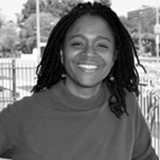 Lola Smallwood Cuevas is a project director at the UCLA Labor Center and co-founder of the LA Black Worker Center. Her work at the Labor Center has focused on exploring the role of unions and African-American workers in Los Angeles’s economy.
Lola Smallwood Cuevas is a project director at the UCLA Labor Center and co-founder of the LA Black Worker Center. Her work at the Labor Center has focused on exploring the role of unions and African-American workers in Los Angeles’s economy.
Incubated at the UCLA Labor Center, the Los Angeles Black Worker Center (LABWC) is the first worker center in California focused on solving the Black job crisis through action and unionization. It is the model for a National Black Worker Center Project. The BWC aims to build power among Black workers to create greater access to quality jobs, address employment discrimination, and transform industries that employ black workers. The LABWC grew out Ms. Smallwood-Cuevas work coordinating the UCLA African-American Union Leadership School (AAULS). Serving as a national model, the LA BWC helped to launch the National Black Workers Center Project. There are currently centers operating in Oakland; Chicago; Baltimore, D.C., and St. Louis. Ms. Smallwood-Cuevas currently serves on the executive committee of the National Black Worker Center Network. Additionally, Smallwood-Cuevas is co-editor of the UCLA Labor Center publication Women’s Work: Los Angeles Homecare Workers Revitalize the Labor Movement (2009) and co-author of “Common Cause,” a chapter on LA’s Black community and labor in the newly released UCLA Bunche Center publication Black Los Angeles: American Dreams and Racial Realities (NY University Press). She serves as a Commissioner for Los Angeles County Workforce Investment Board; on the steering committee of the AFL_CIO National Worker Center Advisory Council and Coalition to End Wage-Theft. Before joining the Labor, Center Smallwood-Cuevas worked as researcher and later as political and community coordinator for the Service Employees International Union. She has a background in journalism, working as a daily beat reporter for the Chicago Tribune, Long Beach Press-Telegram, and the Oakland Tribune. She was introduced to labor organizing as an active member of the East Bay Newspaper Guild.
Manuel Criollo
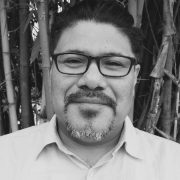 Currently Activist-in-Residence Fellow at UCLA
Currently Activist-in-Residence Fellow at UCLA
Manuel Criollo was the former Director of Organizing and longtime leader and member at the Labor Community Strategy Center.
Manuel guided and directed the Strategy Center’s organizing and campaigns for over 15 years. As lead organizer of the Community Rights Campaign, he lead regional campaigns with Black and Brown students that challenged policies and practices in the city and county of Los Angeles that criminalized Black and Latino youth, particularly the school-to-jail track in LA Unified School District, with the largest dedicated school police force in the country.
For nearly a decade, Manuel was the lead the organizer of the Bus Rider Union, the country’s largest grassroots mass transit organization.
He has worked on a wide range of local, regional and statewide campaigns, and has done solidarity work with social movements in Chiapas, Mexico, El Salvador and Venezuela. Before coming to the Strategy Center, Manuel was the Project Director of the SALUD Project at Clínica Para Las Américas.
He received his BA from University of California, Santa Barbara in History and Latin American Iberian Studies, where he organized youth and students against anti-immigrant and anti-affirmative action ballot initiatives in California.
In 2006, he was recognized by La Opinion as one of the “Future Leaders of Los Angeles” and in 2010 he was awarded the prestigious Soros Justice Fellowship for his work toward ending LA truancy ticketing policies. Son of immigrants from El Salvador, Manuel grew up in Pico Union. Fluent in Spanish.
Matthew Mizel
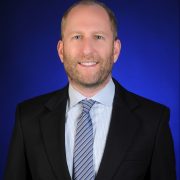 Matthew Mizel is a doctoral candidate in social welfare at UCLA. His dissertation tests social psychological factors that contribute to unequal treatment of African American defendants in criminal charging, bail, and plea bargaining. Matthew received his MSW from UCLA and his BA from Stanford University in psychology with honors. As a doctoral student at UCLA, he has published research on re-entry interventions, criminal desistance, and the minimum age for juvenile court eligibility. Matthew worked as a summer associate at the RAND Corporation in 2016 on research examining the impact of postsecondary prison education and in 2015 on a study of the school-to-prison pipeline. As an undergraduate at Stanford, he wrote a thesis that employed an intervention based on stereotype threat theory to reduce racial and gender disparities in academic performance. Matthew began teaching creative writing to incarcerated youth in 2003 through the non-profit InsideOut Writers (IOW) and has taught over 1,500 classes since then. He mentors youth and young adults after their release from incarceration through both IOW and the Anti-Recidivism Coalition (ARC). With ARC, Matthew has engaged in policy education on sentencing with the California legislature. He has worked in South Africa providing guidance on policy and programs to address crime, incarceration, and re-entry. Prior to enrolling in the UCLA social welfare doctoral program, Matthew worked in film and was the Co-Producer of Step Up 2: The Streets and the Associate Producer of A Walk to Remember.
Matthew Mizel is a doctoral candidate in social welfare at UCLA. His dissertation tests social psychological factors that contribute to unequal treatment of African American defendants in criminal charging, bail, and plea bargaining. Matthew received his MSW from UCLA and his BA from Stanford University in psychology with honors. As a doctoral student at UCLA, he has published research on re-entry interventions, criminal desistance, and the minimum age for juvenile court eligibility. Matthew worked as a summer associate at the RAND Corporation in 2016 on research examining the impact of postsecondary prison education and in 2015 on a study of the school-to-prison pipeline. As an undergraduate at Stanford, he wrote a thesis that employed an intervention based on stereotype threat theory to reduce racial and gender disparities in academic performance. Matthew began teaching creative writing to incarcerated youth in 2003 through the non-profit InsideOut Writers (IOW) and has taught over 1,500 classes since then. He mentors youth and young adults after their release from incarceration through both IOW and the Anti-Recidivism Coalition (ARC). With ARC, Matthew has engaged in policy education on sentencing with the California legislature. He has worked in South Africa providing guidance on policy and programs to address crime, incarceration, and re-entry. Prior to enrolling in the UCLA social welfare doctoral program, Matthew worked in film and was the Co-Producer of Step Up 2: The Streets and the Associate Producer of A Walk to Remember.
Michael Lens
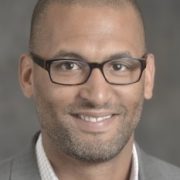 Michael C. Lens is Associate Professor of Urban Planning and Public Policy and Associate Faculty Director of the Lewis Center for Regional Policy Studies at the UCLA Luskin School of Public Affairs. He conducts research on housing markets and policy, neighborhood effects, and segregation by income and race.
Michael C. Lens is Associate Professor of Urban Planning and Public Policy and Associate Faculty Director of the Lewis Center for Regional Policy Studies at the UCLA Luskin School of Public Affairs. He conducts research on housing markets and policy, neighborhood effects, and segregation by income and race.
Professor Lens has a Ph.D in Public Administration from New York University’s (NYU) Wagner School, where he served as a Research Fellow at NYU’s Furman Center for Real Estate and Urban Policy. Michael also has a Bachelor of Arts in Political Science from Macalester College, a Master of Public Policy from the University of Michigan, and a Master of Science in Public Administration from NYU.
Specifically, his work explores the potential of public policy to address housing market inequities that lead to negative outcomes for low-income families, focusing on neighborhood safety and access to jobs. This research 1) measures the neighborhood conditions of families that receive housing subsidies; 2) analyzes the potential interactions of crime with subsidized housing and commercial development; 3) identifies how residential location affects employment outcomes; and 4) improves how scholars and policy makers measure neighborhood opportunity for low-income households.
In recent research, Professor Lens is studying the effect of the housing bust on housing subsidy demand and local government finances, the role of public investments in gentrification processes, and the spatial concentration of eviction. Professor Lens’ research has won awards from the Journal of the American Planning Association and Housing Policy Debate.
Professor Lens teaches courses on Quantitative Analysis, Community-Based Research, Housing Markets and Policy, Poverty and Inequality, Community Development and Research Methods.
Michael Mendoza
 Michael was sentenced to adult prison as a young person. At 15 he was told that he had no hope of changing and would spend the rest of his life in prison serving a life sentence. Through redemption, education, family support, and smart policy (SB 260), Michael would demonstrate his transformation after 17 years and prove that we can safely reduce our prison population.
Michael was sentenced to adult prison as a young person. At 15 he was told that he had no hope of changing and would spend the rest of his life in prison serving a life sentence. Through redemption, education, family support, and smart policy (SB 260), Michael would demonstrate his transformation after 17 years and prove that we can safely reduce our prison population.
Prior to joining #cut50, Michael worked at the Center on Juvenile and Criminal Justice as a case manager. He worked with families and at-risk-youth on probation to provide wrap around services and help bridge gaps to their needs. As a member of the Anti-Recidivism Coalition, he collaboratively works with a group of members who were also formerly incarcerated or impacted by the criminal justice system to build safe neighborhoods and policy that promotes equity. In addition to working on several campaign steering committees on smart policy, he also conducts workshops for people who are currently incarcerated. His work within the walls of confinement provide hope and resources that will help them regain their humanity within our societies.
In 2017, Michael will have completed his B.A. in political science at San Francisco State University and will continue to pursue a higher education.
Noah Grynberg
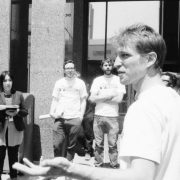 Noah Grynberg is a co-director of the Los Angeles Center for Community Law and Action and a board member of the Los Angeles chapter of the National Lawyers Guild. He is a 2012 graduate of Harvard Law School, where he was a canvassing coordinator and board member of Project No One Leaves and a student advocate with Harvard’s Tenant Advocacy Project (TAP). He also served as an editor of the Harvard Law Review. Prior to co-founding LACCLA, Noah was a law clerk on the United States District Court for the Northern District of Georgia.
Noah Grynberg is a co-director of the Los Angeles Center for Community Law and Action and a board member of the Los Angeles chapter of the National Lawyers Guild. He is a 2012 graduate of Harvard Law School, where he was a canvassing coordinator and board member of Project No One Leaves and a student advocate with Harvard’s Tenant Advocacy Project (TAP). He also served as an editor of the Harvard Law Review. Prior to co-founding LACCLA, Noah was a law clerk on the United States District Court for the Northern District of Georgia.
Paul Ong
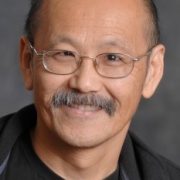 Professor Ong has done research on the labor market status of minorities and immigrants, displaced high-tech workers, work and spatial/transportation mismatch, and environmental justice. He is currently engaged in several projects, including an analysis of the relationship between sustainability and equity, the racial wealth gap, and the role of urban structures on the reproduction of inequality.
Professor Ong has done research on the labor market status of minorities and immigrants, displaced high-tech workers, work and spatial/transportation mismatch, and environmental justice. He is currently engaged in several projects, including an analysis of the relationship between sustainability and equity, the racial wealth gap, and the role of urban structures on the reproduction of inequality.
Previous research projects have included studies of the impact of defense cuts on California’s once-dominant aerospace industry, the impact of immigration on the employment status of young African Americans, and the influence of car ownership and subsidized housing on welfare usage.
Dr. Ong is the Director of the Center for Neighborhood Knowledge and editor of AAPI Nexus, and has served as an advisor to the U.S. Bureau of the Census, and to the California Department of Social Services and the state Department of Employment Development, as well as the Wellness Foundation and the South Coast Air Quality Management District.
He received a master’s in urban planning from the University of Washington, and a Ph.D. in Economics, University of California, Berkeley. Along with his quantitative research, his professional practice includes teaching and applying visual forms of communication.
Rahim Kurwa
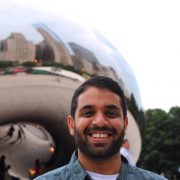 Rahim Kurwa is a Ph.D. Candidate in the Department of Sociology at the University of California, Los Angeles. He studies the intersection of policing, evictions, and racial segregation. His dissertation illustrates how local residents and city governments in the Antelope Valley region of Los Angeles have used the municipal code system as a vehicle for evicting Section 8 voucher renters from neighborhoods in the Antelope Valley. He recently served as a steering committee member for the US Campaign for Palestinian Rights. Starting this fall, he will be an Assistant Professor in the Department of Criminology at the University of Illinois.
Rahim Kurwa is a Ph.D. Candidate in the Department of Sociology at the University of California, Los Angeles. He studies the intersection of policing, evictions, and racial segregation. His dissertation illustrates how local residents and city governments in the Antelope Valley region of Los Angeles have used the municipal code system as a vehicle for evicting Section 8 voucher renters from neighborhoods in the Antelope Valley. He recently served as a steering committee member for the US Campaign for Palestinian Rights. Starting this fall, he will be an Assistant Professor in the Department of Criminology at the University of Illinois.
Susan Burton
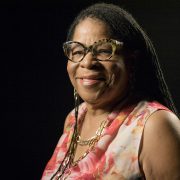
June 14, 2017 — McLean, VA, U.S.A — Susan Burton, author of “Becoming Ms. Burton: From Prison to Recovery to Leading the Fight for Incarcerated Women,” poses for a portrait. — Photo by Jasper Colt, USA TODAY Staff ORG XMIT: JC 6/14/2017 (Via OlyDrop)
Following the tragic accidental death of her five-year-old son, Susan’s world collapsed. Her loss snapped the final tether of resilience burdened by a past of pain and trauma. She descended into an emotional abyss of darkness and despair, yet was not offered the resources needed to heal. Without support, she turned to drugs and alcohol which led to nearly 20 years revolving through cycles of incarceration.
Drawing on her personal experiences, she founded A New Way of Life Re-Entry Project (ANWOL) in 1998 – dedicating her life to helping others break the cycle of incarceration. ANWOL provides resources such as housing, case management, employment, legal services, leadership development and community organizing on behalf of, and with, people who struggle to rebuild their lives after incarceration.
Susan has earned numerous awards and honors for her work. In 2010, she was named a CNN Top Ten Hero and received the prestigious Citizen Activist Award from the Harvard Kennedy School of Government. She is a recipient of both the Encore Purpose Prize (2012) and the James Irvine Foundation Leadership Award (2014). In 2015, on the 50th Anniversary of Selma and the Voting Rights Act, Susan Burton was named by the Los Angeles Times as one of eighteen New Civil Rights Leaders in the nation. Released in 2017, her memoir, Becoming Ms. Burton received a 2018 NAACP Image Award for Outstanding Literary Work in the category of Biography/Autobiography. Becoming Ms. Burton is also the recipient of the inaugural Goddard Riverside Stephan Russo Book Prize for Social Justice.
Terra Graziani
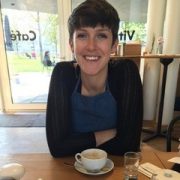 Terra Graziani is a graduate student in urban planning at UCLA, and organizer with The Anti-Eviction Mapping Project, a digital storytelling collective documenting San Francisco Bay Area displacement and resistance struggles through participatory action research, oral history, and data visualization. She is currently organizing a new chapter of AEMP in Los Angeles.
Terra Graziani is a graduate student in urban planning at UCLA, and organizer with The Anti-Eviction Mapping Project, a digital storytelling collective documenting San Francisco Bay Area displacement and resistance struggles through participatory action research, oral history, and data visualization. She is currently organizing a new chapter of AEMP in Los Angeles.
Theresa Zhen
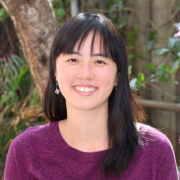 Theresa Zhen is a Staff Attorney and Clinical Supervisor of the Clean Slate Practice at the East Bay Community Law Center, a legal clinic of University of California, Berkeley School of Law. She developed and co-leads a new decriminalization of poverty (DECOP) unit designed to provide holistic, wrap around legal services to indigent criminal defendants who suffer the collateral consequences of predatory court-ordered fines and fees. She provides holistic civil legal services in criminal and traffic court, on driver’s license suspensions and against aggressive collections efforts. Theresa is a founding member of California’s Back on the Road coalition, which secured the passage of a landmark law to end driver’s license suspensions for failure to pay court fines. Along with her community partners, she co-authored numerous reports that shed light on the problem of monetizing our criminal justice system, including Not Just a Ferguson Problem: How Traffic Courts Drive Inequality in California and Stopped, Fined, Arrested: Racial Bias in Policing and Traffic Courts in California. She has appeared in the LA Times, OC Register, East Bay Express, KQED, and NPR to speak out against racial disparities and state-sanctioned wealth stripping of individuals and communities of color. Prior to joining EBCLC, Theresa was a Skadden Fellow at A New Way of Life Reentry Project, where she started a Fines and Fees project in South Central Los Angeles, the epicenter of California’s mass incarceration crisis. Theresa is a graduate of UCLA School of Law’s David J. Epstein Public Interest Law and Policy Program and the Critical Race Studies Program. She received her B.A. with honors from Stanford University.
Theresa Zhen is a Staff Attorney and Clinical Supervisor of the Clean Slate Practice at the East Bay Community Law Center, a legal clinic of University of California, Berkeley School of Law. She developed and co-leads a new decriminalization of poverty (DECOP) unit designed to provide holistic, wrap around legal services to indigent criminal defendants who suffer the collateral consequences of predatory court-ordered fines and fees. She provides holistic civil legal services in criminal and traffic court, on driver’s license suspensions and against aggressive collections efforts. Theresa is a founding member of California’s Back on the Road coalition, which secured the passage of a landmark law to end driver’s license suspensions for failure to pay court fines. Along with her community partners, she co-authored numerous reports that shed light on the problem of monetizing our criminal justice system, including Not Just a Ferguson Problem: How Traffic Courts Drive Inequality in California and Stopped, Fined, Arrested: Racial Bias in Policing and Traffic Courts in California. She has appeared in the LA Times, OC Register, East Bay Express, KQED, and NPR to speak out against racial disparities and state-sanctioned wealth stripping of individuals and communities of color. Prior to joining EBCLC, Theresa was a Skadden Fellow at A New Way of Life Reentry Project, where she started a Fines and Fees project in South Central Los Angeles, the epicenter of California’s mass incarceration crisis. Theresa is a graduate of UCLA School of Law’s David J. Epstein Public Interest Law and Policy Program and the Critical Race Studies Program. She received her B.A. with honors from Stanford University.
Tia Koonse
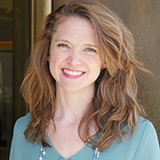 Tia Koonse is the Legal and Policy Research Manager at the UCLA Labor Center, where she provides legal research on low-wage industries and program support for ReWork: The Worker Justice Institute. She holds a law and a master’s degree (’11) in urban planning from UCLA’s Epstein Program in Public Interest Law and Policy, with concentrations in Critical Race Studies and Community Development and Housing. She was co-Editor-in-Chief of the Los Angeles Public Interest Law Journal. Tia convenes conferences, trainings, and workshops with enforcement agencies, such as the State Labor Commissioner, the CA Department of Fair Employment and Housing, and the City of Los Angeles Office of Wage Standards. She spearheads the Labor Center’s partnerships with unions and worker centers to implement legislation that lifts standards in low wage industries. Recent co-authorships include Profiles, Practices and Needs of California’s Domestic Work Employers, with Saba Waheed, Lucero Herrera, Reyna Orellana, and Blake Valenta (May 2016); Get to Work for Go to Jail: Workplace Rights Under Threat, with Noah Zatz, Steven Shafer, and Han Lu, UCLA School of Law, Theresa Zhen, A New Way of Life Re-entry Project, and Lucero Herrera, UCLA Labor Center (March 2016); Crisis in Care: How Conditions in Home Care Put Families and Workers At Risk, with Lucera Herrera, Kevin Liu, and Jeylee Quiroz (April 2016); Enforcing City Minimum Wage Laws in California: Best Practices and City-State Partnerships, with Annette Bernhardt and Miranda Dietz, UC Berkeley Labor Center (October 2015); More than Minimum Wage: Recommendations for Comprehensive Labor Protections in the City of Los Angeles (May 2015); Health Impact Assessment of the Proposed Los Angeles Wage Theft Ordinance (August 2014); Exploring Targeted Hire: An Assessment of Best Practices in the Construction Industry, with Lucero Herrera and Saba Waheed (April 2014), and Hollow Victories: The Crisis in Collecting Unpaid Wages for California’s Workers, with Eunice Cho and Anthony Mischel, National Employment Law Project (July 2013).
Tia Koonse is the Legal and Policy Research Manager at the UCLA Labor Center, where she provides legal research on low-wage industries and program support for ReWork: The Worker Justice Institute. She holds a law and a master’s degree (’11) in urban planning from UCLA’s Epstein Program in Public Interest Law and Policy, with concentrations in Critical Race Studies and Community Development and Housing. She was co-Editor-in-Chief of the Los Angeles Public Interest Law Journal. Tia convenes conferences, trainings, and workshops with enforcement agencies, such as the State Labor Commissioner, the CA Department of Fair Employment and Housing, and the City of Los Angeles Office of Wage Standards. She spearheads the Labor Center’s partnerships with unions and worker centers to implement legislation that lifts standards in low wage industries. Recent co-authorships include Profiles, Practices and Needs of California’s Domestic Work Employers, with Saba Waheed, Lucero Herrera, Reyna Orellana, and Blake Valenta (May 2016); Get to Work for Go to Jail: Workplace Rights Under Threat, with Noah Zatz, Steven Shafer, and Han Lu, UCLA School of Law, Theresa Zhen, A New Way of Life Re-entry Project, and Lucero Herrera, UCLA Labor Center (March 2016); Crisis in Care: How Conditions in Home Care Put Families and Workers At Risk, with Lucera Herrera, Kevin Liu, and Jeylee Quiroz (April 2016); Enforcing City Minimum Wage Laws in California: Best Practices and City-State Partnerships, with Annette Bernhardt and Miranda Dietz, UC Berkeley Labor Center (October 2015); More than Minimum Wage: Recommendations for Comprehensive Labor Protections in the City of Los Angeles (May 2015); Health Impact Assessment of the Proposed Los Angeles Wage Theft Ordinance (August 2014); Exploring Targeted Hire: An Assessment of Best Practices in the Construction Industry, with Lucero Herrera and Saba Waheed (April 2014), and Hollow Victories: The Crisis in Collecting Unpaid Wages for California’s Workers, with Eunice Cho and Anthony Mischel, National Employment Law Project (July 2013).
Tony Roshan Samara
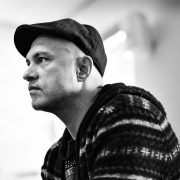 Tony is the program director of Land Use and Housing at Urban Habitat, in Oakland, CA. In that role he helps to coordinate the Bay Area regional tenant organizing network (RTO). Since 2007 he has worked with the Right to the City Alliance as a resource ally, and currently serves on the Alliance’s national steering committee.
Tony is the program director of Land Use and Housing at Urban Habitat, in Oakland, CA. In that role he helps to coordinate the Bay Area regional tenant organizing network (RTO). Since 2007 he has worked with the Right to the City Alliance as a resource ally, and currently serves on the Alliance’s national steering committee.
For the full recap story, photos and videos of the event, click here.
Workshop reports coming soon.
For questions about the conference, please contact:
337 Charles E. Young Drive East
Los Angeles, CA 90095
challengeinequality@luskin.ucla.edu
via Bluesky @challengeineq.bsky.social
